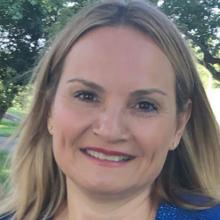- Featured institution and leadership
- What are your Accelerating Change in Medical Education project and goals?
- What are some recent accomplishments related to your Accelerating Change in Medical Education work that would be of interest to others in the medical community?
- How has your work as a member of the Accelerating Change in Medical Education Consortium prepared you to respond to disruptions related to COVID-19?
- What do you think will change about medical education in the next five years?
- Can you share some strategies to maintain team engagement and well-being in this challenging time?
Each month, the AMA highlights institutions that are part of the AMA Accelerating Change in Medical Education Consortium to showcase their work with the consortium and innovations in medical education.
Featured institution and leadership
Maya M. Hammoud, MD, MBA
Professor and associate chair for education
Chief of Women’s Health Division
University of Michigan Medical School
Number of years in the consortium: 2 years
What are your Accelerating Change in Medical Education project and goals?
I am the principal investigator on the AMA Reimagining Residency Grant to the Association of Professors of Gynecology and Obstetrics (APGO) “Transforming the UME to GME Transition for Obstetrics and Gynecology: Right Resident, Right Program, Ready Day One.” This project aims to improve the continuum of education between undergraduate and graduate medical education by changing the application and Match processes to ensure that the right resident matches to the right program and is ready on day one of residency.
The project strives to optimize the alignment and compatibility between interested applicants and potential residency programs. The core of our project is to implement an Early Result Acceptance Program (ERAP) for Match 2023 and develop a transition to residency curriculum. This will allow programs to review and select applicants holistically and make full use of the time from matching to matriculation.
The project has organized curricula for utilizing the fourth year of medical school after matching to improve medical knowledge and skills in preparation for residency. We will create coached experiences to improve the transition process as well as coaching communities for matched residents to develop a sense of community, camaraderie and support from other matched residents.
What are some recent accomplishments related to your Accelerating Change in Medical Education work that would be of interest to others in the medical community?
In addition to two successful years instituting specialty wide standards for application and interview guidelines and common dates with greater than 90% compliance in the past application session, our project has led the way in the development of approaches to virtual interviews, especially critical during the COVID-19 pandemic.
We have provided several webinars aimed at program directors, managers and applicants on the process of applying and interviewing in a virtual environment with the principles of diversity, equity and inclusion at the forefront.
We have successfully published several papers on the implementation of specialty wide standards, examining the excessive applications and their effects on the system, the potential effects that COVID would have on this past year’s cycle, and the concepts of how to improve transparency among programs and applicants. While these projects occurred in the OBGYN community, the principles and concepts are widely applicable to all specialties.
How has your work as a member of the Accelerating Change in Medical Education Consortium prepared you to respond to disruptions related to COVID-19?
The broad range of collaborators brought together for this project and the infrastructure that was created allowed the OBGYN specialty to respond effectively to the disruptions caused by COVID-19. The relationships built with other consortium members have allowed us to bring a broader perspective to our actions and recommendations.
What do you think will change about medical education in the next five years?
In the next five years, medical education will be competency-based, not time-fixed in place by the traditional four-year medical school curriculum or the traditional length of a specialty training. There will be several rounds per year of residency applications and matches (a staged match) that will meet the needs of our learners as well as our health care system. No longer will there be thousands of brand new residents all starting on July 1, instead there will be hundreds beginning at different intervals so that at any one time there will be experienced and less experienced trainees caring for patients, as opposed to the current system of a large bolus of inexperienced trainees at one time.
In a parallel process, trainees will experience a more well-balanced experience, advancing at their own pace which allows for the completion of training earlier for some and later for those who require extra-time. A key component of this will be the implementation of the ERAP in 2023. This will be the first step toward establishing the efficacy and ability of a staged match to work.
Can you share some strategies to maintain team engagement and well-being in this challenging time?
Building a community centered around specific goals to improve the learners’ experience has been one of the most effective ways to maintain team engagement during the pandemic. Making sure all our stakeholders are heard and engaged in conversations has empowered our team to be flexible, pivot and make changes as needed.
While our ambitious timeline was developed prior to the beginning of the pandemic, it was important to be flexible and make appropriate changes as the world was changing around us. Having regular meetings and making sure the entire community is giving feedback has been a key strategy allowing our team to stay connected and share solutions to disruptions that have occurred.




